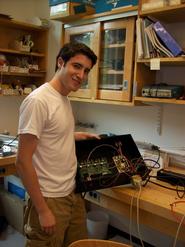
While other summer researchers in physics are working on projects like aCORN and the SEOP neutron polarizer, Andrew Portuguese ’11 is like a stage technician who jumps between multiple projects. He is currently creating a graphical user interface for a magnetic field mapper along with Professor of Physics Gordon Jones. The interface and mapper are designed to better the lives of scientists at NIST (National Institute of Standards and Technology).
The device will help physicists improve the strength of their magnetic fields. It lines up with a field and takes data within a specified area, then plots and saves the data. Portuguese is making the interface for the mapper using the computer program IGOR, a cross between a programming language like C++ and Excel. “Computer scientists hate it because it’s not efficient at all,” Portuguese said. “But physicists love it because they just want to get things done.”
Last summer he worked with Assistant Professor of Physics Natalia Connolly on a long-term project involving Type Ia supernovae. His and Connolly’s research could help uncover the mysteries of dark energy and the expansion of the universe. Portuguese found the project interesting, but decided he would rather do something more hands-on this summer.
He certainly needs to understand the efficacy of different approaches. As a physics major on the pre-med track, Portuguese is still getting used to the subtle variations in methods between physics and chemistry. Alternating from capacitors to lipids to protons – and then pressing the rewind button – is what Portuguese does on an almost daily basis during the school year.
“Majoring physics is a stretch but it’s sometimes helpful,” Portuguese says of the physics major. “Pre-meds can basically major in whatever they want. But physics and chemistry have two very different approaches. Chemists generally take for granted the techniques they think will work because what they’re doing is on such a high level. But physicists only work with situations they completely understand. All of the qualitative situations in chemistry make me a little uncomfortable because so many assumptions need to be made.”
Besides juggling both his pre-med and physics requirements, Portuguese participates in many clubs and organizations on campus. He is the co-founder of the campus publication Afternoon Delight, he plays the baritone saxophone in the Hamilton’s saxophone ensemble, and he competes on the Debate Team.
Portuguese is a graduate of the Academy for Math, Science and Engineering.
The device will help physicists improve the strength of their magnetic fields. It lines up with a field and takes data within a specified area, then plots and saves the data. Portuguese is making the interface for the mapper using the computer program IGOR, a cross between a programming language like C++ and Excel. “Computer scientists hate it because it’s not efficient at all,” Portuguese said. “But physicists love it because they just want to get things done.”
Last summer he worked with Assistant Professor of Physics Natalia Connolly on a long-term project involving Type Ia supernovae. His and Connolly’s research could help uncover the mysteries of dark energy and the expansion of the universe. Portuguese found the project interesting, but decided he would rather do something more hands-on this summer.
He certainly needs to understand the efficacy of different approaches. As a physics major on the pre-med track, Portuguese is still getting used to the subtle variations in methods between physics and chemistry. Alternating from capacitors to lipids to protons – and then pressing the rewind button – is what Portuguese does on an almost daily basis during the school year.
“Majoring physics is a stretch but it’s sometimes helpful,” Portuguese says of the physics major. “Pre-meds can basically major in whatever they want. But physics and chemistry have two very different approaches. Chemists generally take for granted the techniques they think will work because what they’re doing is on such a high level. But physicists only work with situations they completely understand. All of the qualitative situations in chemistry make me a little uncomfortable because so many assumptions need to be made.”
Besides juggling both his pre-med and physics requirements, Portuguese participates in many clubs and organizations on campus. He is the co-founder of the campus publication Afternoon Delight, he plays the baritone saxophone in the Hamilton’s saxophone ensemble, and he competes on the Debate Team.
Portuguese is a graduate of the Academy for Math, Science and Engineering.
Posted August 12, 2009
